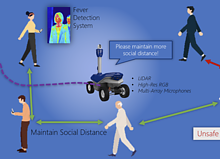GAMMA Team Receives NSF Funding to Develop Robots to Assist in Social Distancing

University of Maryland faculty in the Geometric Algorithms for Modeling, Motion, and Animation (GAMMA) research group have received funding from the National Science Foundation (NSF) to develop robotic systems able to assist humans in maintaining social distancing guidelines.
Dinesh Manocha, the Paul Chrisman Iribe Professor of Computer Science, and Aniket Bera, an assistant research professor in the University of Maryland Institute for Advanced Computer Studies (UMIACS), are principal investigators of the $120K NSF award.
The funding comes from NSF’s Early Concept Grants for Exploratory Research (EAGER) program, which supports exploratory work on untested, yet potentially transformative, ideas or approaches.
Motivated by the COVID-19 pandemic, the GAMMA project is exploring how mobile robots can help pedestrians in public places or office environments efficiently navigate spaces while maintaining recommended social distancing guidelines.
The researchers plan to develop new methods that leverage machine learning, computer vision, and robot motion planning to identify the positions of pedestrians as they move in a confined area.
Underlying challenges include development of new navigation algorithms that can compute collision-free paths for a robot in medium and high-density crowds, says Manocha, who also has appointments in the Department of Electrical and Computer Engineering and UMIACS.
The team’s pedestrian-tracking approach is based on a novel concept known as Frontal Reciprocal Velocity Obstacles, which uses an elliptical approximation of each pedestrian motion, and then estimates the underlying dynamics by considering intermediate goals and collision avoidance.
The GAMMA team also plans to investigate the use of cameras, thermal sensors and microphones on the robots to automatically check humans for vital signs like body temperature, respiratory rates, heart rates and blood pressure.
